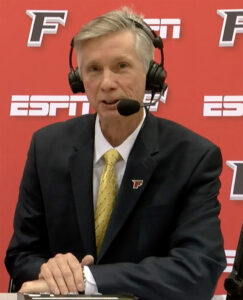The Voices of New York Sports, a Brief History
From Marty Glickman to Marv Albert, from Bill Mazer to Mike and the Mad Dog, the New York sports scene has been narrated, discussed and debated by some of the most talented and compelling personalities in the history of sportscasting. We’ll explore their stories and some of the memorable New York sports moments that they helped bring to life.
Bob Heussler is a veteran radio and television sportscaster with over 35-years of experience working in New York and Connecticut. He was an update anchor for the country’s first all-sports radio station – New York City’s WFAN – for 30 years and remains with the station on a part-time basis. Heussler has a long association with the Fairfield University men’s basketball program as their radio and television play-by-play announcer, recently completing his 35th season with the Stags. Heussler was the radio and television play-by-play announcer of the WNBA’S Connecticut Sun for 17 years, beginning with their inaugural season in 2003. He remains a back-up play-by-play radio announcer for the NBA’s Brooklyn Nets. Heussler was a sportscaster for the Connecticut Radio Network for over 15 years, serving as the radio play-by-play announcer for UConn basketball and football and providing coverage of the Pilot Pen Tennis tournament and PGA Greater Hartford Open. He is a former network anchor for ESPN Radio and remains an anchor with the CBS Sports Radio Network on a part-time basis. Heussler is a former sports director at WICC in Bridgeport, has been an instructor of student broadcasters at Yale and Fairfield and was the longtime director of public relations at Milford Jai-Alai. A graduate of the University of Bridgeport, Heussler currently resides in Stamford.
Speaker Summary
Long-time sports announcer Bob Heussler took us through a tour of the history of the development and evolution of sports radio, with a focus on the New York sports market and its biggest and, in his opinion, best broadcasters and personalities.
A life-long Mets fan, Bob got his passion for radio from his mother and turned it into a career that encompassed announcing games for college and professional sports teams in the New York area as well as providing sports updates on the original sports talk radio station, WFAN, including a stint with the revolutionary team of Mike & The Mad Dog.
Bob started with a history of how the print medium dominated sports reporting before radio became a primary vehicle for sports coverage. He talked about early radio pioneers and how they influenced those who came after them and notable broadcasters who have been associated with New York sports teams. He shared the progression from sports announcers to sports personalities to broadcast teams. Bob paid special homage to 2 of the stars of NY sportscasting, Marty Glickman and Marv Albert, and what made them special and how they influenced the next generation of NY sports voices. To emphasize his points, Bob shared audio clips of famous moments in New York sports history and of key voices of sports in New York.
Bob then talked about the rise of “sports talk” radio, including some of the early stars in New York who had programs on radio stations that also provided news, music, etc. He then detailed how WFAN created 24-hour sports radio despite initial poor performance and how it was saved thanks to Don Imus and the creation of the legendary team of Mike Francesa and Chris Russo (Mike and the Mad Dog) who redefined sports talk radio and became the blueprint for so many other radio and TV talk shows that are about sports debates and “hot takes”. He also noted that they have been imitated but never matched.
Bob shared his personal list of New York’s five most impactful sportscasters: Marv Albert, Mike and the Mad Dog, Marty Glickman, Mel Allen, and Bill Mazer. He then closed with a few thoughts on some other New York sports voices that were important and needed to be acknowledged.
An engaging Q&A session followed including suggestions of other great voices in other markets and how current trends (e.g., corporate sponsorships and sports betting) have impacted the state of current sports broadcasting.

